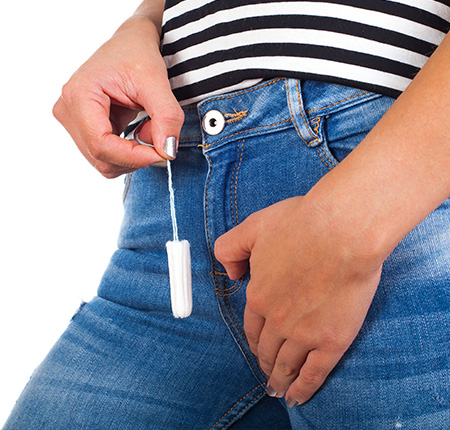
If you don't want to get pregnant and you're thinking of avoiding it by planning sex before your period, think twice! Although the chances of pregnancy are lower, because most likely ovulation has already taken place, this does not guarantee that you will not get pregnant.
Any unprotected sexual contact comes with a lower or higher risk of pregnancy. So yes, you need to protect yourself every time, because there are situations when you can get pregnant before your period. In the following lines, we explain exactly which factors influence this probability.
What is and when does ovulation occur?
A main factor affecting the possibility of getting pregnant and the reason why it is so low before menstruation is ovulation. If we are talking about a regular menstrual cycle of 28-29 days, ovulation usually occurs on day 14.
Ovulation consists of the release of a mature egg by the ovaries, which may or may not be fertilized. If it meets a sperm, it later attaches itself to the uterine wall and pregnancy begins.
The reason why ovulation is so important in the formation of a pregnancy is that the ovum only survives for 24 hours. If it is not fertilized during this time, it will be broken down and removed along with the endometrial tissue and menstrual blood during menstruation.
This explains why the chances are much lower that you can get pregnant 1-2 days before your period, because most likely ovulation has already happened. After ovulation, the chances of pregnancy decrease drastically because there is no more egg that can be fertilized.
However, I told you at the beginning of the article that unprotected sex before your period cannot guarantee you protection against pregnancy. Why? Because you have no way of knowing exactly when you ovulate. Every body is different and hormone levels fluctuate from month to month, so ovulation can occur earlier or later even with regular cycles – but especially if your cycle is irregular.
What happens if the menstrual cycle and ovulation are irregular?
When you have an irregular cycle, it is much more difficult to correctly approximate the ovulatory (fertile) period and the period of the next period. If your cycle length varies from month to month, it means you can't rely on the idea that you ovulate on day 14. You can't plan intercourse before your period because you don't know when your period is coming in the first place and you don't have the certainty that ovulation has occurred, which means that a pregnancy is possible.

Causes of menstrual irregularities
Some women have always had an irregular menstrual cycle. In some cases, it settles after the first few years of onset. Other times, periods continue to come irregularly and make it very difficult to track your fertile period.
There are many possible causes for such menstrual irregularities which we have discussed in more detail HERE , but among the most common are:
Polycystic Ovary Syndrome: Irregular periods are a common symptom of PCOS, which I told you all about in another article on the Enroush blog .
Uterine polyps: a frequent cause of intermenstrual bleeding, irregular and heavy periods, but also of bleeding after sexual contact, is uterine polyps .
Stress: When you have a stressful lifestyle, the brain secretes higher amounts of cortisol which can cause delays in your menstrual cycle. You can find more information about stress and how it affects your period HERE .
Endometriosis: It is a common cause of menstrual irregularities, especially periods with heavy bleeding and terrible pain. If you want to read more about endometriosis, how to recognize it and what we know about it so far, we have an article HERE .
Eating disorders: A diet that lacks essential nutrients or includes excesses of any kind can cause hormonal disturbances and weight problems, which in turn will cause menstrual cycle irregularities
Age: It is normal for the menstrual cycle to be irregular in response to hormonal changes, which occur mostly in the early years of menstruation and in the later years as menopause approaches.
When can you get pregnant before menstruation?
If you have a perfectly regular menstrual cycle and know exactly when your period comes each time, you can more easily track and correctly approximate the ovulatory period. Thus, you can calculate how many days before menstruation you cannot get pregnant (approximately).

But the chances of pregnancy before menstruation increase in the following cases:
When ovulation occurs later than normal, for example as a result of high cortisol levels after a stressful period or changes in diet. If fertilization occurs right then, it can lead to pregnancy.
When you have an irregular menstrual cycle, because you can't tell when you're ovulating.
In case you confuse ovulation bleeding with menstrual bleeding, not realizing that you are actually in your fertile period.
How do you avoid getting pregnant before your period?
Before menstruation or during any phase of the menstrual cycle, if you do not want a pregnancy, avoid unprotected sex. Here are the methods available to you to protect yourself:
Use contraceptive methods: You have many options, including condoms (the only method that also protects you from sexually transmitted diseases), birth control pills, the IUD, or other effective contraceptive methods.
Use emergency contraception: If you have had unprotected sex, emergency contraception can prevent pregnancy if taken as soon as possible within 72 hours.

How do you know if you got pregnant after unprotected sex before menstruation?
Missing a period is the most obvious sign of a possible pregnancy. If you know you had unprotected sex before your period, it's a good idea to pay attention if your period is late or missed. Besides that, look at some other symptoms that you can notice among the first signs of pregnancy :
Implantation bleeding, which can appear as light bleeding 10-14 days after conception and can be mistaken for menstruation.
Nausea, vomiting and fatigue as the body's progesterone levels rise.
Increased sensitivity or pain in the breasts, which may increase in volume.
When should you take a pregnancy test?
If your period is late, you notice other early symptoms or you have any suspicion of pregnancy after unprotected sex, pregnancy tests are the simplest, fastest and most effective way to confirm whether or not you are pregnant. In case of a positive result, it is a good idea to see a doctor to decide what you want to do next and to discuss the next steps.






















